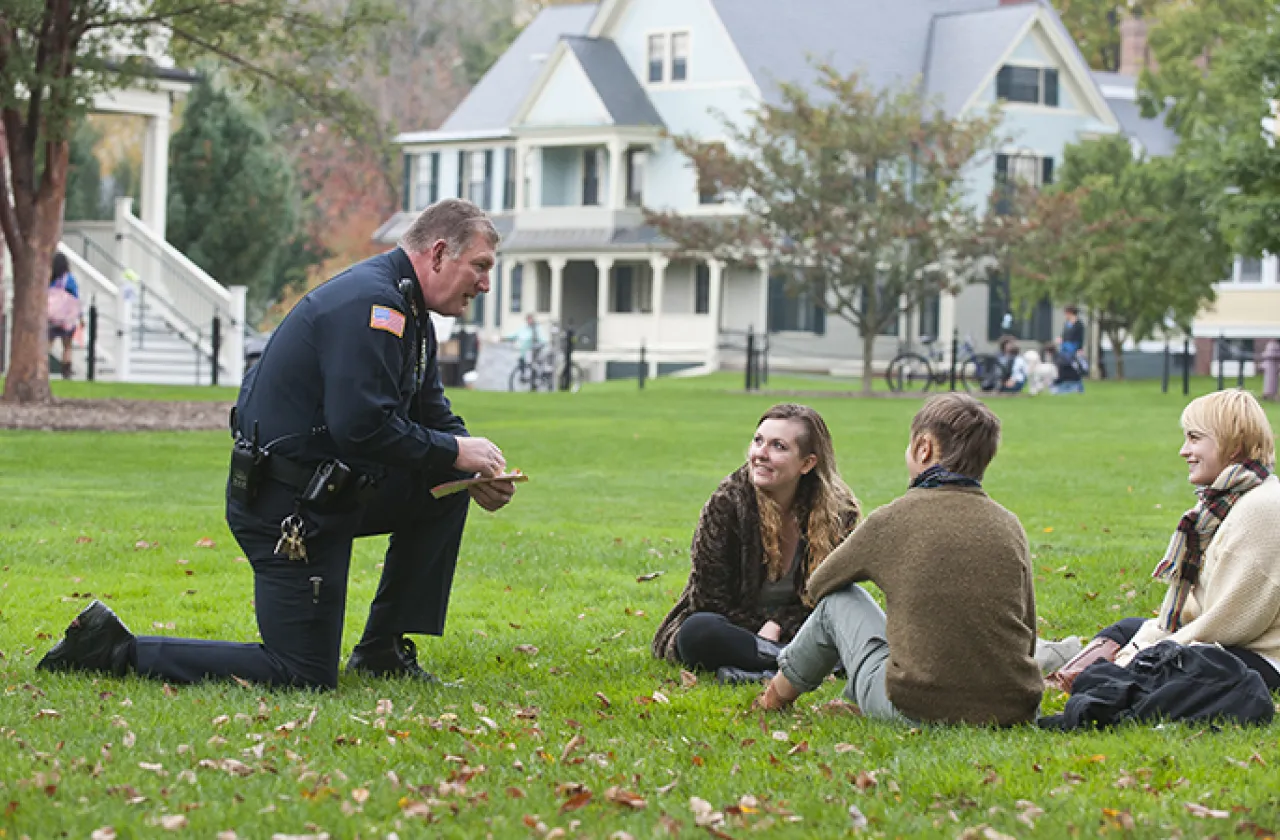Title IX Support
Emergencies
On Campus: Call Campus Safety at extension 5555 or 413-585-5555.
Off Campus: Dial 911 for law enforcement and emergency services.
This resource guide provides students with information on campus resources that are available to assist sexual assault survivors and information on preventing sexual violence.
Sexual assault is a serious crime that can impact a survivor's physical, mental, social, and academic well-being. The resources identified on these pages encompass a range of options, from academic accommodations to emotional support to judicial or legal proceedings.
Accessing any or all these resources is an individual choice. The offices and staff members listed in this guide are available to answer questions or assist you in accessing the resources you need. Do not hesitate to seek us out if you or a friend is struggling. If you believe you are a survivor or are unsure if a crime has occured, please seek help.
If you have questions or comments about the information contained in this guide please contact the dean of students office by phone at 413-585-4940 or by email.
By Massachusetts General Law, the police and court records that contain the name of the victim in a case of rape or assault with intent to rape must be withheld from public inspection. Except as permitted by a judge, it is unlawful to publish or disclose victim's names.
For Survivors of a Sexual Assault
If you are sexually assaulted or raped, take the following steps to ensure your safety:
- Get to a safe place
Go somewhere where there are people: a friend's room, your house, a busy street. Be sure you are in a safe place before calling for help. - Tell someone
It's good to contact someone you trust who can help you sort out what resources are available and what you want to do. See Additional Resources for a list of confidential contacts. - Get medical attention
Get medical attention to detect injuries and test for sexually transmitted diseases. A health care provider can also collect evidence if you decide to take legal or disciplinary action. - Seek support
See Additional Resources for confidential contacts on campus and in the local community.
You may then choose to report the incident and/or consider legal action. If you anticipate filing charges, see Preserving Evidence.
For Friends of a Sexual Assault Survivors
You can support a friend by providing what comfort you can and seeing that the necessary medical aid is available and provided and that proper steps are taken to reporting the incident to Campus Police, other college officials, or local authorities. You should accompany your friend until all necessary procedures have been completed. Most of all:
- be supportive and reassuring
- encourage your friend to express feelings about what has happened
- be interested and empathic without prying or pressing for details
- do not to criticize or judge
- respect your friend's decisions who to tell, whether or not to report to the police
- do not project your own feelings of anger or helplessness; talk about these feelings with another friend or professional counselor
Our policies around gender-based violence and sexual misconduct can be found here:
Gender-Based and Sexual Misconduct Policy
Campus Police
Campus Police is required by federal law to notify the members of the community of incidents that place people at risk. The survivor's name in all public reports of sexual assaults is kept confidential, by Massachusetts law, and will not be released without permission, except as otherwise required by law.
Campus Police officers will assist victims by:
- arranging for medical attention for any injuries;
- fully investigating the incident;
- providing a liaison with the Northampton Police Department and the Hampshire County District Attorney's office (if requested by the victim); and
- advising survivors of their rights to counseling and other services offered by the college and the community.
What Happens When You Contact Campus Police
- A uniformed officer will arrive and ensure your safety. The officer will encourage you to go to Health Services, Cooley Dickinson Hospital, or UMass Health Services based on the nature of your situation. The Campus Police officer will escort you wherever you decide to go.
Cooley Dickinson Hospital and the UMass Health Services have on staff Sexual Assault Nurse Examiners (SANE nurses) trained in sexual assault response including handling evidence collection required in the event you file legal charges against the assailant. (NOTE: You are not required to press charges if you have a SANE Exam.)
- The officer will ask for a description of the assailant for possible apprehension and other information that may help ensure your continued safety.
- The officer will call in one of the department's sexual assault investigators who will interview you about the details of the assault or rape. The officer will suggest that a counselor be present along with medical staff to reduce the number of times you are asked to retell the incident. Other options such as notification of the emergency to on-call staff will also be discussed.
We encourage our students to report all sexual harassment and sexual misconduct directly to the support team below. All college employees who become aware of an incident of sexual misconduct will notify the appropriate college officials as identified below.
Support Team
The resources below will support you and provide you with information regarding options, including judicial procedures, interim remedies and ongoing emotional support. They can also assist in eliminating the misconduct, preventing its occurrence and addressing the effects.
Campus Police
413-585-2490 or extension 800
Available 24 hours a day
Deans
Assist with academic concerns, changes in housing and other accommodations and referrals.
Undergraduate students call 413-585-4940 or extension 4940 for the dean of students and student affairs; members of the staff are also available 24 hours a day through Campus Police.
Graduate students call 413-585-3017 or extension 3017 for the director of graduate students; School for Social Work students call 413-585-7966 or extension 7966 for the associate dean.
Title IX Coordinator and Equity Officer
Coordinates prompt and equitable responses to reports of sexual misconduct by eliminating the misconduct, preventing its occurrence and addressing the effects.
Contact the interim Title IX Coordinator at titleixcoordinator@smith.edu.
Your Privacy
Smith will seek to maintain your privacy during the process consistent with the college's legal obligations and its commitment to providing an environment free from sexual and gender-identities discrimination.
The decision to report an assault is up to you. The most important thing is to choose the path that is most productive towards your recovery; for many survivors, just having their assault counted and on record is an important step in regaining the power they lost.
Prompt reporting of sexual assaults is strongly encouraged. Prompt reporting gives the college the best opportunity to stop sexual assaults, prevent their recurrence, and address their effects. Offenders can be apprehended and kept from repeating their actions.
Submission of the form below is a report to the Title IX coordinator of the college. The Title IX coordinator will follow-up with the reporter, after reviewing the report, to determine appropriate next steps.
About the Report
THE VICTIM MAY BE ANONYMOUS
Smith College uses a sexual assault reporting form to gather accurate information on about the incident on campus. All submitted reports will be reviewed and investigated, no matter how much information is provided. Reporters are encouraged to complete the form with as many details as they can. The more details provided, the better the college can respond. Requiring a minimal amount of general information, the form in no way requires the identification of the sexual assault survivor.
IS NOT LEGAL ACTION
This report will be submitted to the Title IX coordinator of the college. Reporting a sexual assault or rape to Campus Police establishes and preserves evidence and officially documents the incident to ensure your legal rights are protected; it does not mean you must pursue prosecution. However, the report will support your case if you decide to prosecute in a court of law. If you wish to report a crime to Campus Police please contact them at 413-585-2490 or at extension 800.
This form will be sent confidentially to the interim Title IX Coordinator.
Students may confidentially report to members of the following departments on campus at the time of the assault or after:
- Medical Services: 413-585-2800
- Campus Police: Extension 5555 or 413-585-5555
- Student Affairs administrator on call/Residence Life: call Campus Police
Recovery
If you have been sexually assaulted you are likely to experience emotional shock, denial, nightmares, sleeplessness, flashbacks, changes in appetite, difficulty working and concentrating, and feelings of guilt, despair, depression, self-blame or anger. Feeling overwhelmed is a natural response. Survivors may feel ashamed; think that the pain will go away; not be sure if what happened was really rape; believe they are responsible in some way.
This initial stage is followed by a period of recovery, during which you may vacillate between feeling completely recovered and still feeling traumatized.
The most important thing is that you not isolate yourself and that you make a positive choice to spend time with people who believe you and support you. Spend time with people who can assist you and who can help you sort out what you need to do to take care of yourself.
Counseling and Support Groups
Working through and talking about your feelings will be most effective in getting on with your life. Many students find solace with counselors or attending support groups.
Accommodations
Students may be able to change their academic and living situations after a sexual assault. Requests for these changes are coordinated through the Dean of Students Office.
Self-Defense Classes
Many students find self-defense classes like Rape Aggression Defense (R.A.D.) reduce feelings of helplessness and vulnerability.
Disciplinary and Legal Action
Survivors have the option of bringing criminal charges against their assailants and/or college disciplinary actions when their assailants are students or employees of Smith College. The reasons for doing so vary. For some survivors pursuing these options helps to restore their sense of personal integrity and power, and fulfills a need to protect others in the community from suffering similar harm.
Taking action against your assailant takes a great deal of courage. Although the decision to proceed has to be made by you, this does not mean that you have to go through the decision-making process alone. Campus Police and other college officials will provide support for students filing a complaint.
Preserving Evidence
If legal action is a consideration, the following steps should be taken to preserve evidence:
- Do not change out of the clothing you were wearing at the time of your assault. If you must change, place your old clothes in a paper bag and do not wash it.
- As much as you may want to, do not shower, bathe or clean up in any way.
- Do not apply medication or cosmetics.
- Pack a change of clothes to bring to Health Services or the hospital. Health Services will refer victims to Cooley Dickinson Hospital for a physical examination.
College Judicial Board
Assault Committed by a Student
Sexual assaults or rapes allegedly committed by a Smith College student can be reported and adjudicated by the college Judicial Board.
During a college disciplinary case, the survivor is not required to directly confront the alleged assailant or be physically present during the proceedings, and interim safeguards (such as no contact orders) may be implemented while the disciplinary process is pending. Both parties are informed of the outcome of the disciplinary proceeding. Sanctions arising from a campus disciplinary proceeding alleging a rape (including acquaintance rape) or other sex offense (forcible or nonforcible) include, but are not limited to, suspension or expulsion from the college.
For more information on campus disciplinary proceedings see the College Judicial Board website or the Student Handbook.
Assault Committed by an Employee
Sexual assaults allegedly committed by a Smith College employee will be reviewed under the college's Human Resources disciplinary policies. The college may take disciplinary action to protect the college, regardless of the outcome of any criminal case. Sanctions arising from an employee disciplinary proceeding alleging a rape (including acquaintance rape) or other sex offense (forcible or nonforcible) include but are not limited to termination of employment.
See the Smith College Staff Handbook for more information.
Civil and Criminal Complaints
A student who is the victim of a crime on campus will be given information about off-campus resources and procedures for filing a civil or criminal complaint in a court of law. Students are strongly encouraged to consider and investigate this option.
Victim/Witness Assistance Unit
The Victim/Witness Assistance unit of the Northwestern District Attorney's (D.A.'s) office provides guidance to victims throughout the investigation and complaint process.
The D.A.'s office will provide information about the court process, survivor's rights, restraining orders and social service referrals. They will also facilitate consultation with an attorney to discuss the viability of a case.
There are many ways to prevent sexual assault, from ensuring doors are not propped open to speaking up when you witness a questionable interaction.
Determining whether there is a problem
Not knowing when to intervene is one of the main barriers to bystanders stepping up. Cues that a situation is concerning or becoming dangerous might be obvious or they might be more subtle. Some signs to look for:
- Aggressive or violent behavior
- Attempts to get someone drunk in order to "hook up"
- Attempts to physically separate a person, to get them alone
- Intimately touching someone in public, especially if they've just met or the other person is drunk
How to intervene if there is a problem
Here are some general tips for initiating bystander interventions:
- Be friendly. Antagonism begets antagonism, and we want you to be safe too. Being friendly will decrease any awkwardness you might feel; think of it as checking in, not confronting.
- Recruit help. More people means more diffusion of the situation.
- Be as intrusive as necessary. You're making sure both people are safe. (If the building were burning down, you wouldn't hesitate to break up the conversation or knock on the door.)
Some intervention strategies
Talk to a third person. Find a friend of one of the two people and talk about your concerns. Get a friend to step in with one person while you step in with the other.
Distract. Take one person aside and talk to him or her about anything. Your presence will help diffuse the situation.
Interrupt. Knock on the door or just walk in. It's better to interrupt a scene than stand around while someone is assaulted. Do anything to change the mood.
Smith College is required by law to develop and disseminate sexual assault policies and statistical information.
The Campus Police Department works in cooperation with Health Services and Residential Life to make sexual assault awareness programs available to houses. Workshops on self-defense, crime awareness, and rape prevention are offered on campus, and rape awareness information is included as part of first-year orientation.
A number of resources are available to Smith College students both on and off campus that can provide support and direction towards recovery.
On Campus
- Campus Police officers trained to assist victims and investigate sexual assaults
Extension 2490 or 413-585-2490
Available 24 hours - Counseling Service at Health Services
Extension 2800 or 413-585-2800 (normal hours)
Extension 2840 or 413-585-2840 (after hours) - Student Organizations (SAFE, SASA)
- Dean of the College
Extension 4900 or 413-585-4900 - Dean of Students/Student Affairs/Residence Life
Available via Campus Police 24 hours a day
Extension 4940 or 413-585-4940 - Class Deans
Extension 4910 or 413-585-4910 - School for Social Work Deans
Extension 7953 or 413-585-7953 and Extension 7962 or 413-585-7962 - Religious and Spiritual Life
Extension 2750 or 413-585-2750 - Human Resources
Extension 2260 or 413-585-2260 - Office of Inclusion Diversity & Equity
Extension 2141 or 413-585-2141
Off Campus
- Cooley Dickinson Hospital (has SANE program)
413-582-2000
Open 24 hours - Northampton Police Department
Emergency: 911
Nonemergency: 413-587-1100 - Center for Women and Community
University of Massachusetts, Amherst
24-hour hotline (anonymous and confidential)
413-545-0800 or 1-888-337-0800 - Sexual Assault Prevention and Survivor Services, Commonwealth of Massachusetts: Department of Public Health
- Victim/Witness Assistance Unit
Northwestern District Attorney, Greenfield, Mass
413-774-3186 - Northampton District Court
413-584-7400 - The U.S. Department of Education's Office of Civil Rights
617-289-0111


